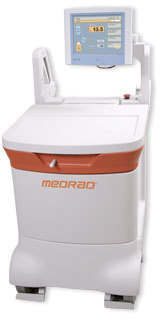MEDRAD Sponsors PET Research
by
Joan Trombetti, Writer | January 07, 2009

Intego System
MEDRAD, Inc., has signed a research agreement with the University of Zurich to study dynamic PET imaging with the MEDRAD Intego™ PET Infusion System. The researchers will utilize MEDRAD's latest technology to more precisely control the radioactive dose delivered during PET imaging procedures.
Specifically, the study will examine patients with tumors in the chest or abdomen and compare standard quantitative techniques, such as standard uptake value (SUV), with more advanced kinetic and compartmental models. One of the primary goals of the research is to explore how controlled delivery technology can enable dynamic imaging by providing additional clinical utility and making these advanced techniques more practical. By enabling the benefit of repeatable infusion of the prescribed FDG dose to all subjects in the study, the Intego System is a key element in the research.
"The research will explore the clinical viability of dynamic imaging with PET," said Dr. Alfred Buck, University of Zurich (Switzerland). The University of Zurich is a leading institution in dynamic PET research, and has licensed its proprietary FDG delivery technology to MEDRAD for use in the Intego PET Infusion System.
The Intego System automatically extracts a patient dose from a multi-dose vial and delivers it directly to the patient, virtually eliminating manual dose preparation and handling, and the corresponding radiation exposure to the technologist inherent in manual preparation. With the Intego System's dose-on-demand capability, the prescribed dose can be delivered when the patient and clinician are ready. This enables the clinician to easily and efficiently respond to schedule changes, patient delays, and add-on patients.
Innovative features, including real-time dose availability information, an integrated ionization chamber, and an optional weight-based dose calculation, allow the healthcare provider to more precisely customize each patient's dose. Safety features include a tungsten multi-dose vial shield, a fully lead-lined mobile cart, and an automated saline flush to remove residual FDG from the line after each infusion.
"Supporting this research with the University of Zurich is an exciting opportunity for us. We believe the Intego System can be a very important tool for advancing PET imaging in the clinical setting, leading to better patient management and clinical outcomes," said Doug Descalzi, Executive Director, MEDRAD Molecular Imaging.
About University of Zurich
The University of Zurich was founded in 1833, though its origins stretch back as far as 1525. Today the University enjoys international renown as a place of education and research. Two thousand lecturers in 140 special institutes provide the broadest range of subjects and courses available from any Swiss seat of higher education. With 24,000 students and 1,900 graduates every year, Zurich is also Switzerland's largest university.
The University provides academic services, works with the private sector and considers itself part of a national and global network for the acquisition and dissemination of knowledge. The University of Zurich is member of the League of European Research Universities (LERU), an association of the twenty leading European universities sharing the values of high-quality teaching within an environment of internationally competitive research.
